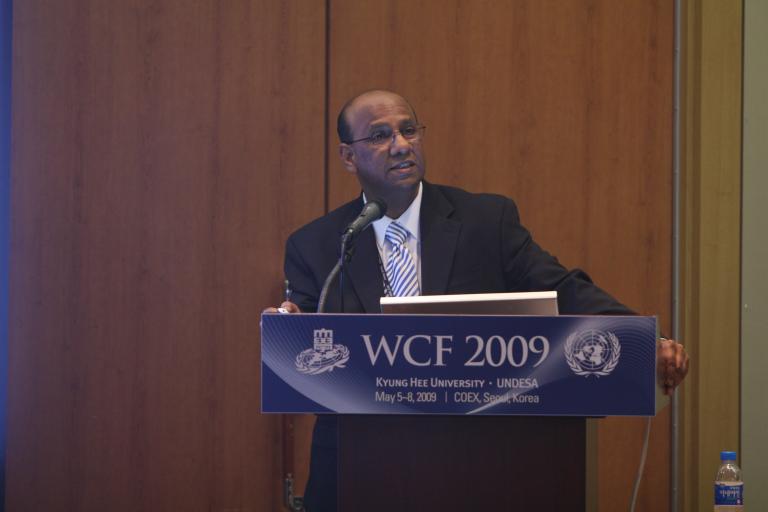
Everyone has heard the phrase “looking at a problem with fresh eyes,” and that is precisely what Dr. Badrinath Rao, associate professor of Liberal Studies at Kettering University has done. Rao has taken a look at conflict resolution through Hindu “eyes,” and has found what he considers to be a resource for conflict resolution through religion.
“The world needs to find new mechanisms to enable people to solve conflicts,” he said, “the use of religion is one attempt at identifying a new approach.” He was able to share his ideas at a global conflict resolution program earlier this year.
Rao began exploring the use of religious traditions as a way to address conflict while completing his doctoral work. His research focused on conflict between religious communities in India and the response of the state and judicial system to these conflicts.
“India is one of the most diverse societies in the world,” he explained, “and as a culture has to deal with these issues more that other societies. My interest emerged from the recurrent and class-based conflicts going on in India, and grew to encompass conflicts in general, and in particular, conflict resolution and alternate dispute resolution.”
According to Rao, the justice system in India is overburdened with cases – approximately 30 million cases at different levels in the judiciary - making speedy and cheap access to justice a major challenge facing India. Hence, the need to explore avenues for alternate dispute resolution, more specifically, from religious traditions, he said.
Analyzing how a non-Abrahamic religious tradition, such as Hinduism, poses a different set of issues in respect to addressing conflict resolution, Rao concluded that Hinduism offers enormous resources for conflict resolution through its emphasis on relational orientation and context-sensitivity (Dharma).
“Because it emphasizes sacrifice, Dharmic obligations and self denial,” Rao said, “Hinduism provides the right values for resolving social disputes.” In traditional Hindu society with its caste structure, Dharma constitutes the religious and moral doctrine of the rights and duties of each individual. (Wikipedia)
The concept of Dharma has entrenched ethical relativism in the Hindu way of thinking, according to Rao. In other words, what a person should or should not do depends on the context of the situation, and virtues and transgressions are both equally dependant on contextual issues. Abrahamic traditions typically have established rules for what is considered a virtue and what is considered a transgression.
One result of a context-based approach is that truth is relative (and something you are never destined to know), and there is no choice but to be tolerant of the truth of others.
Different cultures prefer either context-free or context-sensitive rules in their thought processes,” Rao explained. “Hindus tend to operate on context-sensitivity, which can be interpreted as hypocrisy by those who prefer context-free rules,” (such as those found in Abrahamic traditions).
In Rao’s opinion, Hinduism’s emphases on Dharma, Karma and Satyagraha all provide potent tools for resolving conflicts. He explained the three principles thus: Dharma, which understood variously as the moral order, a principle that binds us all, righteousness, etc.; Karma, emphasizing the inevitability of the consequences of one’s actions, tolerance and non-violence; and Satyagraha, or truth force.
In analyzing the application of Hindu religious traditions in conflict resolution, Rao finds that “the relativism of Dharma supports both tradition and modernity, innovation and conformity.
The main teachings of Hinduism, according to Rao, include the following components:
- An emphasis on suffering, impermanence and contingency;
- Every act is suffused with spirituality and is meant to enable one to realize oneself;
- Self-effacement, not self-assertion, is taught;
- Emphasis on acceptance of different world views, ways of living and preferences, seeing them as a part of cosmic evolution of all forms of life on earth; and
- The doctrine of karma with its emphasis on the consequences of our actions (which can be invoked to inculcate ethical behavior and be used to provide solace victims secure in knowledge wrongdoers will be punished eventually).
Some tenets of Hinduism are at odds with Western culture’s emphasis on the equality of all humans at birth and individualism without concern for obligations to the greater community. According to Rao in traditional Hindu thinking this is reversed, with the identity being experienced as collective and one’s duties or rights premised on the contributions to the social and cosmic order.
“A middle way needs to be found between recognition of the plurality and distinctiveness on one hand and the equality of human beings on the other,” he said. “How can we yoke the resources of Hinduism for addressing issues of conflict resolution? We need to look at the opportunities it provides,” he said, “there are a lot of Hindu teachings that enable people to resolve conflicts.”
Rao cites Mohandas Karamchand (Mahatma) Gandhi’s use of non-violent resistance as addressing conflict resolution from the Hindu perspective. “His use of non-violent resistance was successful in showing the world an alternative to violence and armed conflict.”
As part of his research into conflict resolution, Rao attended a program sponsored by the Dispute Resolution Institute of Hamline University School of Law, held in Budapest. The Dispute Resolution Institute (DRI) offers academic discourse, hands-on simulation experience, and cross-disciplinary examination of ADR themes in domestic and summer abroad courses for law students, lawyers, and other professionals.
Because of his participation, he was asked to share his research with a global audience by making an informal presentation at the “Conflict Resolution from Religious Traditions,” seminar Dec. 31, 2007 through Jan. 10, a joint venture between Hamline University and Hebrew University of Jerusalem. The program focused on the concepts and methods that diverse religious communities use to resolve conflicts.
His presentation, “Conflict Resolution in Hinduism: Challenges and Opportunities,” was attended by students of law from the U.S. and Australia and featured scholars with expertise in law and the Jewish, Christian, Islamic, and Hindu traditions. Rao has been approached about continuing his relationship with Hamline University and the DRI.
Written by Dawn Hibbard
810.762.9865
dhibbard@kettering.edu